All are Welcome at Pay What You Can Restaurants
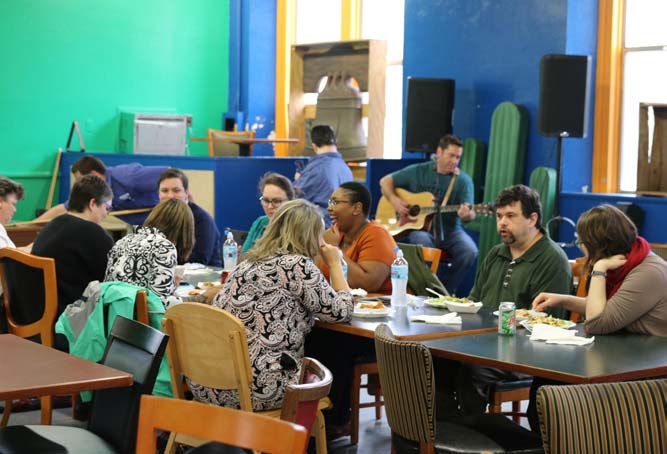
Horses. Bourbon. Basketball. Ask anyone what Kentucky is best known for and these are a few of the answers you may hear. Anyone who’s spent any time here, however, knows that what really makes the Bluegrass State so special is our good food and our Southern hospitality. And if you ever want to find out what happens when you combine the two, you need only visit one of Kentucky’s pay-what-you-can eateries.
Pay-what-you-can means exactly what the name implies, though the specifics can vary from location to location. Take PORKLAND BBQ in Louisville’s Portland neighborhood. While the menu does have set prices, Inga Arvin—who co-founded Porkland with her husband, Shawn—told me, “If you are not able to pay the advertised price, you can pay for your meal by giving your time.” Those who are able to pay will often give a little extra and “pay it forward” to their fellow patrons. “All of the tips we receive are put toward meals for guests who come in and are not able to pay,” Inga added.
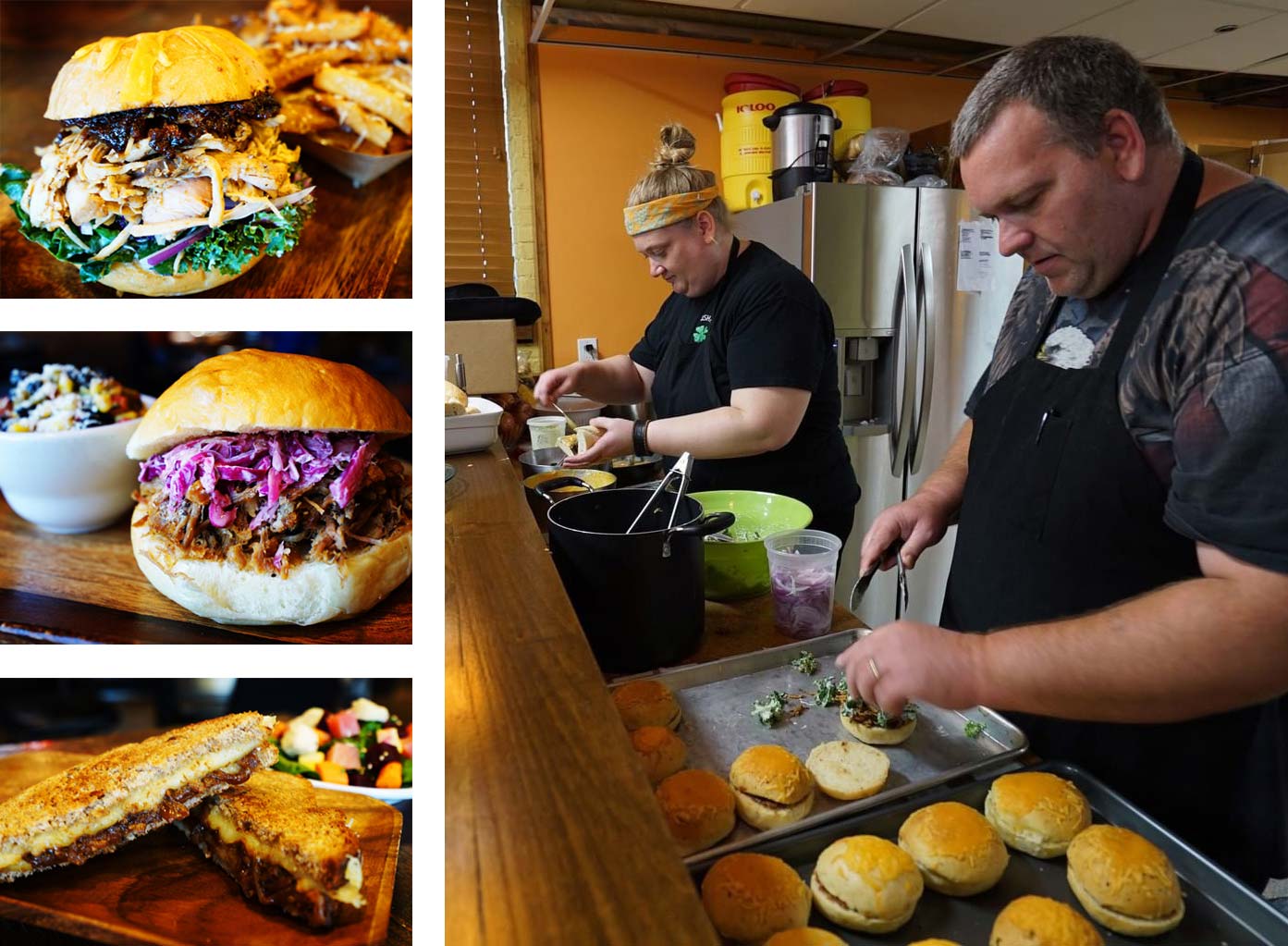
Photos on left: top: Smoked Chicken Sandwich with Parmesan Fries, middle: Smoked Pork Sandwich with Street Corn, bottom: Grilled Cheese with Roasted Root Salad. Photo above: Volunteers are vital in helping The Table Cafe run smoothly. Photos: The Table Cafe
Just down the road is Portland’s THE TABLE CAFÉ. Led by Larry and Kathie Stoess, The Table is just one outreach arm of The Church of the Promise, where Larry is the pastor. Before opening the restaurant in 2015, they’d been looking for ways to address food insecurity in the neighborhood. “Portland, at the time, was a food desert.,” Larry said. “We really wanted to bring in a safe, fun place to share community and address the chronic problem of hunger at the same time. All walks of life can come in and share a meal and conversation around the table.”
Based on the impact they’ve had over the past four years, it seems they are doing just that. “So far this year, we’ve served over 7,000 meals to guests who didn’t have enough money to cover the cost of their meal.” This accounts for 35% of the meals they serve, and it couldn’t be done without guests who give a little extra. “Each item on the menu has a suggested price. Anything you pay over that price will go as a donation toward another guest’s meal.”
Of course, volunteers are also critical to this business model. “If you don’t have enough money to pay for your meal, you can pay with your time,” Larry added. Encouraging people to pay with their time makes The Table more than just a restaurant.
It is also “a place where people with food insecurity can come in and be a part of the mission, not just a person in need.”
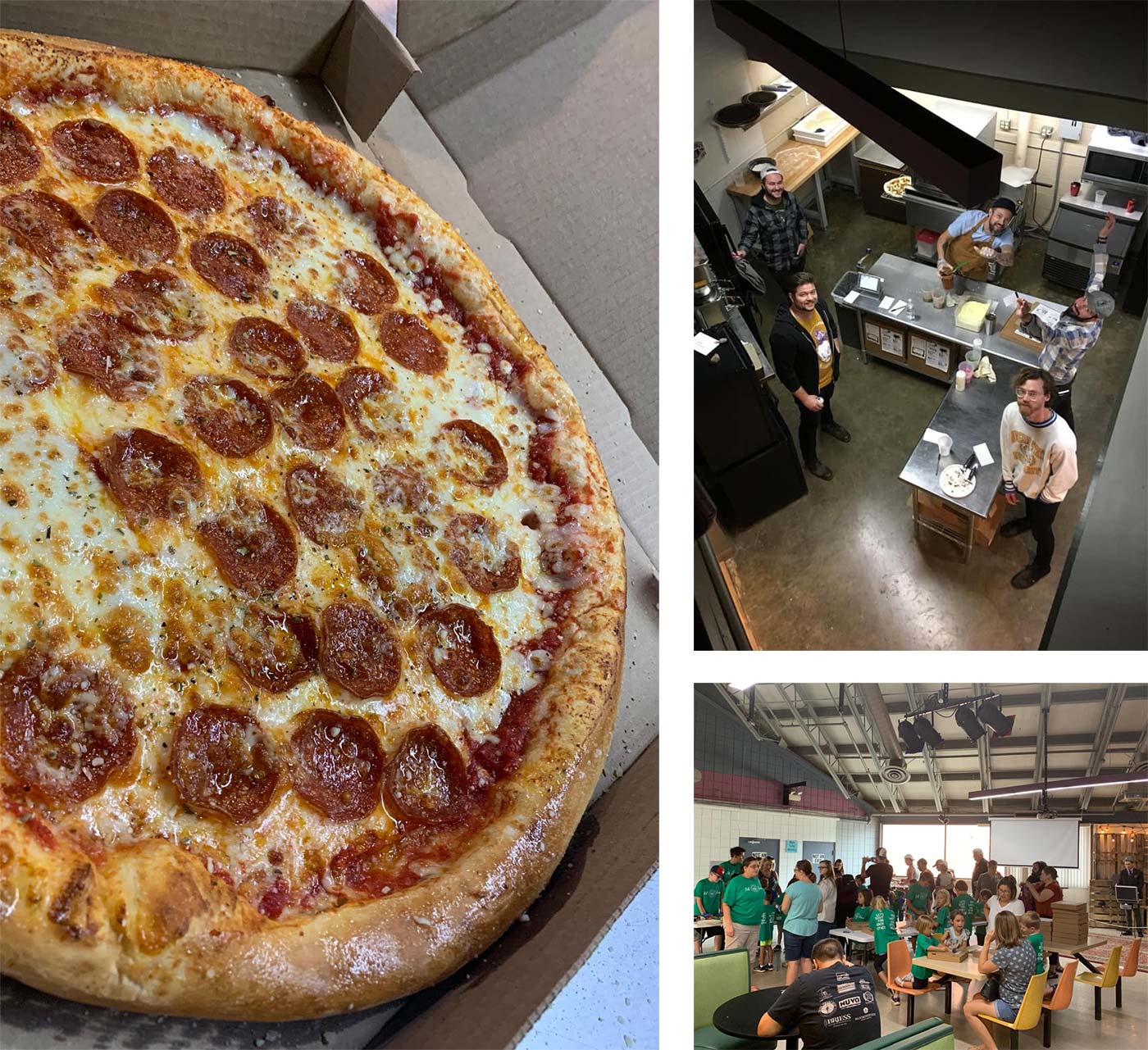
Left: 8th Street Pizza in New Albany started by giving slices away. Top right: The pizza masters at work in the kitchen at 8th Street Pizza. Bottom right: There is room for everyone at 8th Street Pizza
Jeff Minton, who founded 8TH STREET PIZZA just across the Ohio River, saw the same need in the small community of New Albany, Indiana. “When we first started making pizza, we had volunteers going out into the community and giving slices away,” said Andrew Nicholson, 8th Street’s marketing manager. “When you get out there into the community, you get to learn about the people you are serving. You learn their names, what type of pizza they like and what their needs are.”
In the beginning, people were visiting the restaurant simply because they needed a warm meal. Now, people are coming in for specialty pizza nights (led by various local chefs who donate their time), kids cooking classes and even yoga. Andrew noted, “Local businesses, especially the restaurant industry, can often be very competitive. 8th Street Pizza has really brought these groups together to work toward a greater cause. Whether you want to lead a workshop, volunteer an hour of your time or buy a slice of pizza for a neighbor in need, we can provide people an opportunity to give back close to home. It’s really become a beacon of hope for the community.”
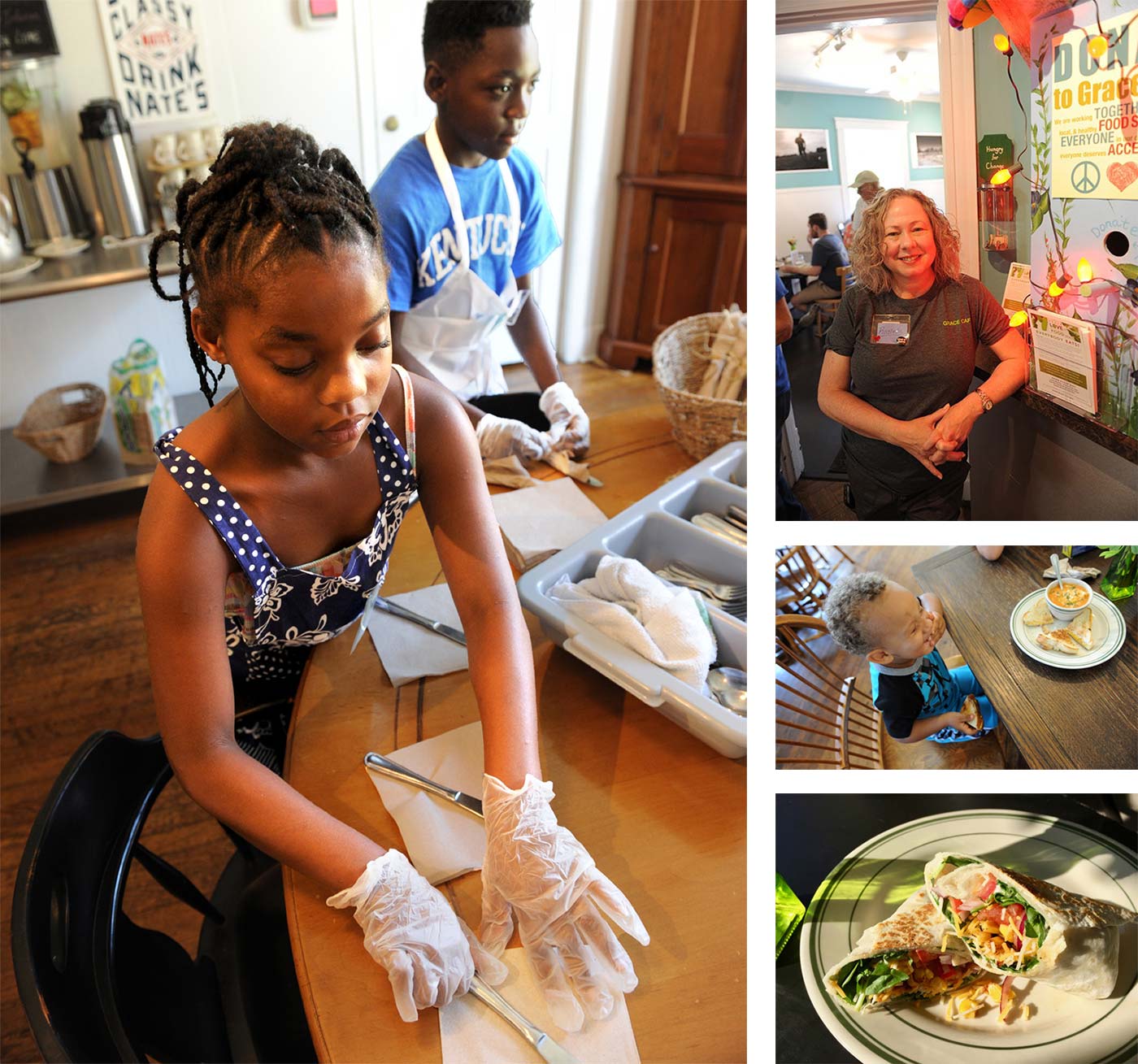
Grace Café—where everyone can lend a hand. Top right: Rochelle Bayless is the founder and executive director of Grace Café.
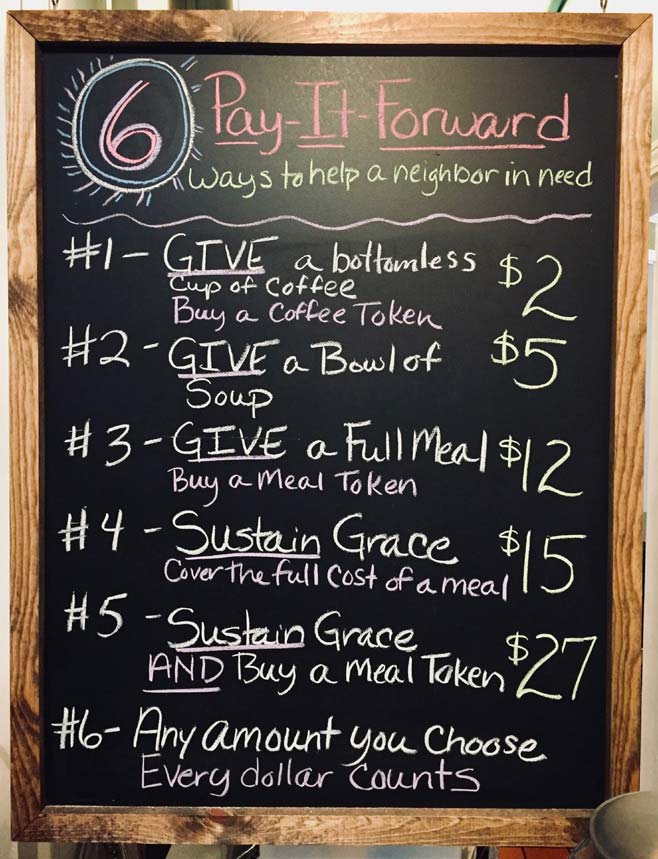
Rock star Jon Bon Jovi was the inspiration for bringing the pay-what-you-can model to Kentucky. Rochelle Bayless, founder and executive director of GRACE CAFÉ in Danville, was watching “Oprah” one day “and Jon Bon Jovi was on the show discussing his JBJ Soul Kitchen [which operates under a similar pay structure] in New Jersey. I’m a huge fan of his and thought it sounded like a brilliant idea.”
Rochelle soon learned that the JBJ Soul Kitchen was not the only restaurant of its kind and went straight to the source when she decided to give it a go in her own neighborhood. Denise Cerretta, who pioneered the pay-what-you-can restaurant movement, paved the way for others with One World Everybody Eats—an organization that supports individuals who want to replicate her philanthropic business model. “I just saw this incredible need in Danville,” Rochelle said. “You don’t necessarily see it on first glance, but if you lift up the layers just a little bit, you can see the incredible amount of poverty in our area and I decided to give it a go.”
Not surprisingly, her instincts were correct. “We’ve really become a hub in town for locals and people passing through who need help. More than just a meal, we can connect people with other local services and resources. People know when they step through our doors, it doesn’t matter where they’ve been or how much money they have, they will be welcome.” The menu here changes daily, but you’re likely to find hearty soups, fresh sandwiches and, of course, a bottomless cup of coffee.
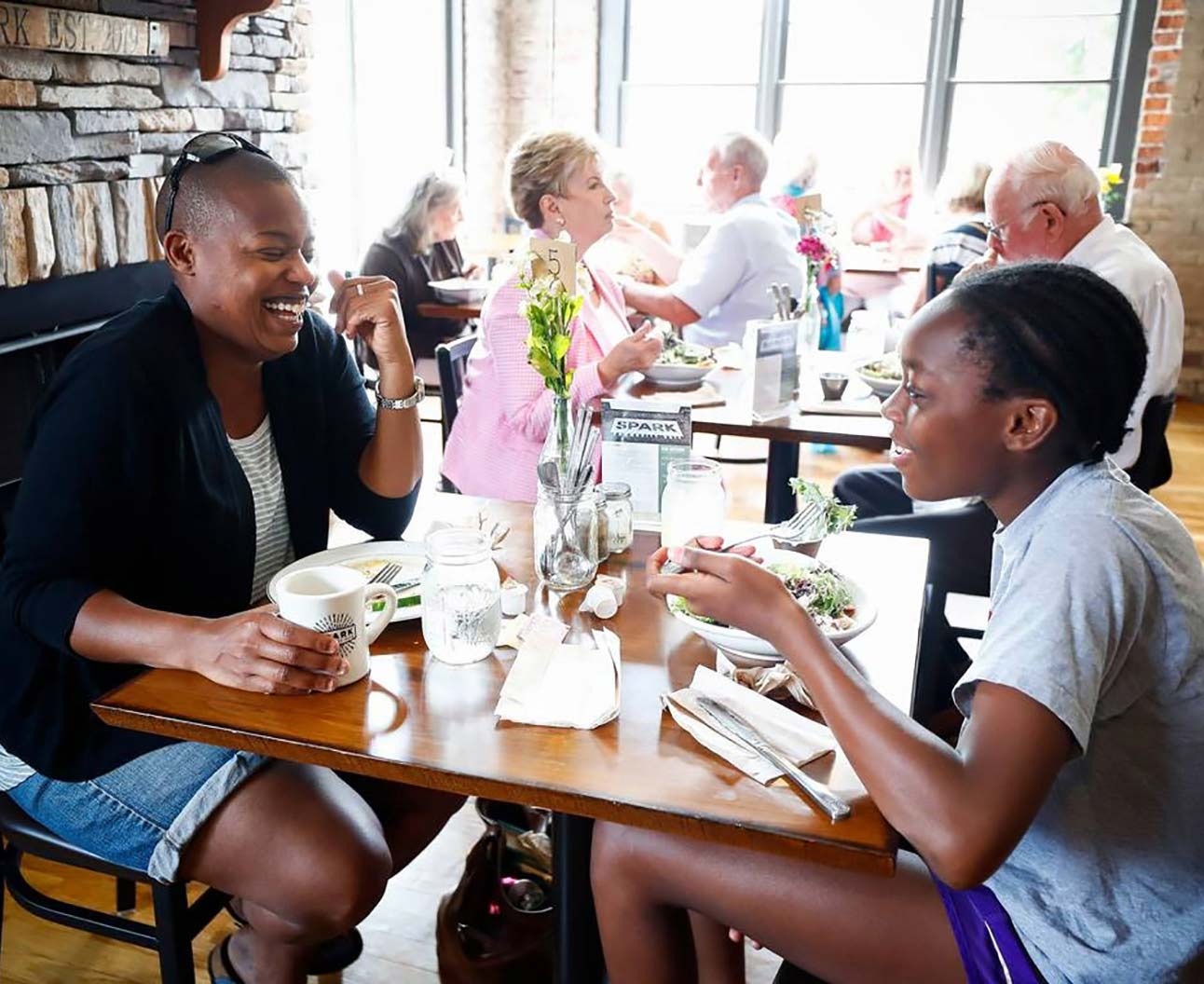
Spark Café builds community and supports local farmers
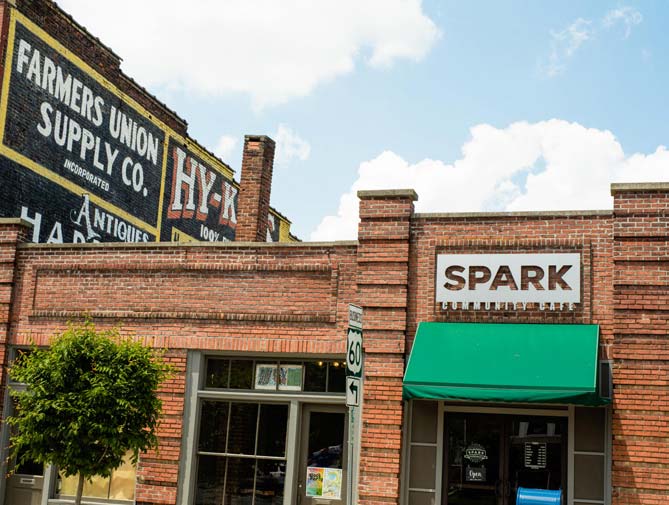
Coffee is exactly what gave SPARK COMMUNITY CAFÉ, not far from Versailles in Danville, Kentucky, its start. At the time, Kyle Fannin was a history and social science teacher at Woodford County High School. He created a community activism class and, as a part of that class, a pop-up festival whose goal was to “spark” the economy of downtown Versailles. When Tristan Ferrell, co-executive director along with Kyle, entered the class during his senior year, he was part of a group of students (including founding board members Rachael Kral, Keegan Elvidge, Kathie Beth Craig, Reagan Jobe, Andy Smith, Ouita Michel, Lori Garkovich and Maria Bohanan) who hosted a pop-up coffee shop called, of course, Spark.
Things went so well that the group, some of whom are still board members today, decided they wanted to give Spark a permanent home. They turned to Rochelle Bayless and Grace Café to learn how to do it. They spent two years learning, fundraising and renovating a building that needed quite a bit of love before opening earlier this year.
“This is definitely a café built by the community. People really got behind the idea and helped us get it off the ground,” Tristan told me. Since they’ve been in business, they’ve served over 350 meals to food-insecure customers paying between zero and five dollars. The menu, which changes seasonally, could include anything from a New York strip with green beans and roasted potatoes to a warm, fluffy sweet potato waffle.
At Spark, like most restaurants operating under this model, strengthening the local food economy is just as important as serving the local community. “We work with local suppliers throughout Woodford, Mercer and Scott counties,” Tristan said. By sourcing locally, Spark is able to provide fresh, high-quality food to its customers and to support local farms like RoughDraft Farmstead and Farmer Joe’s.
The same is true of Grace Café, where part of their core value system is that local, seasonal food is better food. Rochelle “wants to bring in what is coming in off the farm and truly be a farm-to-table restaurant.” Since opening in 2015, Grace Café has invested more than $90,000 in local agriculture by sourcing from local growers and producers. By all accounts, the future looks bright for Kentuckiana’s pay-what-you-can establishments.
Grace Café has outgrown its current space and is currently on the lookout for a larger home. Understanding that transportation is the biggest barrier to food security, Rochelle would also love to add a food truck in the near future.
8th Street Pizza is moving to downtown New Albany to better reach the homeless population in that area. With the hope of always finding more holistic ways to address the needs of New Albany’s underserved communities, there are also talks of a mobile pizza delivery service that would double as a donation pickup and delivery truck. At The Church of the Promise, The Table may be their first social entrepreneurial venture but it certainly isn’t their last. Their most recent initiative is Promise Housing, an organization that helps their Portland neighbors to become homeowners.
Porkland BBQ recently added catering services to their operation, and would like to one day add more dining options and a co-share workspace to the Portland neighborhood. At Spark, Tristan would like to focus the time he has been putting into his studies (he is currently in his senior year at UK) and build out the same type of social entrepreneurship and nonprofit education classes that helped Spark get off the ground.
While each of these restaurants may have different plans for the future, they share a common goal of finding more ways to serve their neighbors. They know that food has a way of bringing people together and at Kentuckiana’s pay-what-you-can restaurants, everybody has a seat at the table.
For more information:





